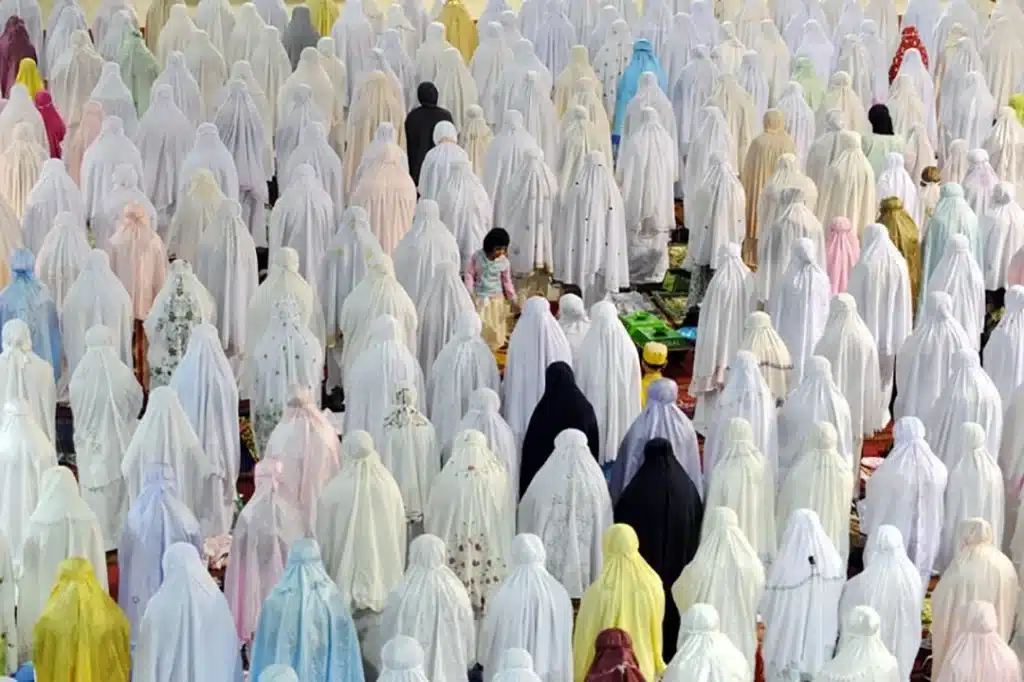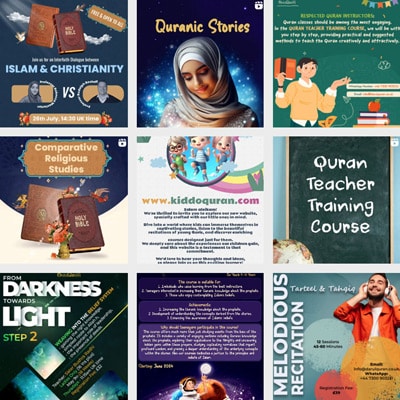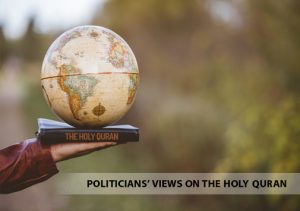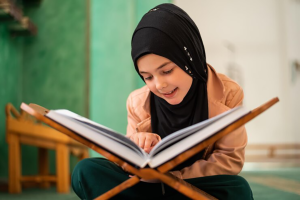The Jihād (fighting in the way of Allah) of the woman is to afford her husband pleasant company, and her husband has the greatest right over her.
Prophet Muhammad (S)
Table of Contents
ToggleExplore the history, principles, challenges, and impact of Islamic feminisms. From its key beliefs to intersectionality, achievements, and controversies, discover the future goals of Islamic feminists.
Islamic Feminist Movements in History
- Great example is the Fatimah bint Muhammad RA, she was a brave and courageous girl who grew up witnessing from a very young age the cruelty and misbehavior of the Quraysh and hence turned out stronger to believe that she had to be courageous with her parents. My daughters quoted the incident of when Abu Jahl slapped her in the street without a reason so she went to Abu Sufyan, the leader of the Quraysh. He walked her back to where Abu Jahl was and directed Fatimah to slap him back just the way he had slapped her. (The lesson for our children to know that bullying of any sort – may they be children or adults is not okay. Children have a right to be treated with respect and they can stand up against adults too)
- Contemporary movements like the Women’s Islamic Initiative in Spirituality and Equality (WISE) and Musawah advocating for gender equality.
Key Principles and Beliefs of Islamic Feminisms
Quranic Interpretation
Islamic feminism is a movement that seeks to promote gender equality within the framework of Islamic teachings and principles.
This movement advocates for the rights and empowerment of women while grounding its arguments in interpretations of the Holy Quran and other Islamic texts.
While some people believe that feminism is incompatible with Islam, various scholars and activists have provided alternative interpretations of the Holy Quran that challenge patriarchal norms and highlight women’s rights in Islamic societies.
One of the central features of Islamic feminism is the reinterpretation of Quranic verses related to women.
These interpretations challenge the traditional understanding of certain verses that have been used to justify the subordination of women. Islamic feminists argue that the Grand Quran emphasizes the equal worth and dignity of both men and women and that gender distinctions should not be interpreted as hierarchy or inferiority.
They bring attention to verses that promote justice, compassion, and mutual consultation between men and women. Islamic feminists emphasize the importance of cultural context and provide historical analysis of early Islamic societies to justify their interpretations.
They argue that patriarchal practices that restrict women’s rights are not inherent to Islam but were influenced by societal norms prevalent at the time of revelation.
By contextualizing the Quranic verses and teachings, Islamic feminists provide a more nuanced understanding of gender roles and argue for equality between men and women.
Furthermore, Islamic feminists actively engage in social and political activism to advance women’s rights within Muslim-majority societies. They challenge discriminatory laws and practices such as forced marriages, gender segregation, and lack of access to education.
Through grassroots initiatives, advocacy, and education, they strive to create a more inclusive and egalitarian society that upholds the values of Islam while promoting gender equality.
Islamic feminism offers an alternative perspective on how to interpret the Glorious Quran in a way that promotes gender equality.
By presenting contextual analysis and reinterpreting certain verses, these feminists challenge patriarchal norms and provide a framework for Muslim women to reclaim their rights within the Islamic tradition.
Through their activism and advocacy, they seek to inspire positive change within Muslim-majority societies and create a more just and egalitarian future for all.

Human Dignity
Growing up in a Muslim family, I’ve always been surrounded by strong, independent women who defy the stereotypes often associated with Muslim women.
These women have always been my role models and have inspired me to delve deeper into the key principles and beliefs of Islamic feminisms about human dignity.
One of the central beliefs of Islamic feminist is the inherent human dignity that is bestowed upon every individual, regardless of gender. Islam teaches that every human being is created in the image of God and is therefore deserving of respect and dignity.
This principle is echoed in the Noble Quran, where it states that men and women are “equal partners” and that “the best among you is the one who is best to his wife.”
This fundamental belief in the equality and dignity of all human beings forms the foundation of Islamic feminisms.
Islamic feminists also emphasize the importance of challenging patriarchal interpretations of Islamic teachings that have been used to justify the oppression of women.
They believe that the Holy Quran and the teachings of the Prophet Muhammad (S) promote gender equality and social justice, and that it is the misinterpretation and misapplication of these teachings that have led to the marginalization of women in Muslim societies.
By reclaiming their religious tradition, Islamic feminists seek to challenge the patriarchal power structures and promote a more inclusive and egalitarian interpretation of Islam.
Islamic feminists advocate for the rights of women and the recognition of their full humanity. They believe that women should have equal access to education, economic opportunities, and political participation.
They also reject the notion that women are solely responsible for the “honor” of the family and should instead be treated as autonomous individuals with their own agency and voice.
Islamic feminists also call for an end to harmful practices such as forced marriage, honor killings, and female genital mutilation, which are often justified in the name of culture or religion.
As an Islamic feminist, I am committed to upholding these key principles and beliefs in my own life.
I believe that every individual, regardless of gender, deserves to be treated with respect, dignity, and equality. I also strive to challenge patriarchal norms and expectations within my community and promote a more inclusive and just vision of Islam that uplifts women and recognizes their full humanity.
Islamic feminisms are rooted in the fundamental belief in the human dignity of every individual, as well as the promotion of gender equality and social justice. By reclaiming their religious tradition and challenging patriarchal interpretations, Islamic feminists seek to empower women and promote a more inclusive and egalitarian vision of Islam.
As an Islamic feminist, I am dedicated to living out these key principles and beliefs in my own life and working towards a more just and equitable society for all.
Justice and Equity
Advocating for equality in legal and social spheres, challenging discriminatory practices and laws.
It is important to note that Islamic feminism is not a monolithic movement, and different individuals and groups may prioritize and interpret these principles differently.
Islamic feminists may hold diverse views on various issues, but they are united in their commitment to promoting gender equality and justice within the framework of Islam.

Intersectionality within Islamic Feminisms
The concept of intersectionality within Islamic feminisms has been a topic of significant debate and discussion in recent years.
With the emergence of various interpretations of the Grand Quran and the Hadith, it has become evident that there are diverse perspectives on gender equality and women’s rights within Islam.
The challenge lies in understanding and integrating the multiple intersecting identities of Muslim women, such as race, class, and sexuality, into the interpretation of Islamic texts and teachings.
One of the primary sources of guidance for Islamic feminists is the Tafsir of the Holy Quran.
Tafsir refers to the interpretation and commentary of the Noble Quran, which seeks to elucidate the meanings and implications of its verses and teachings.
It is within the Tafsir that Islamic feminists seek to find a framework that validates the lived experiences of Muslim women and promotes gender equality within an Islamic context. One of the ways in which intersectionality is manifested in the Tafsir is through the recognition of the various social, economic, and political factors that shape the experiences of Muslim women.
This includes acknowledging the historical and cultural contexts in which the Sacred Quran was revealed and the implications of these contexts on gender relations and women’s rights.
It also involves acknowledging the diverse experiences of Muslim women from different racial and ethnic backgrounds, as well as different socioeconomic statuses.
It is important to note that the integration of intersectionality within Islamic feminisms does not imply a rejection of the Holy Quran or the teachings of Islam. On the contrary, it involves a reclamation and reinterpretation of these texts in a way that aligns with the principles of justice and equality that are intrinsic to Islam.
Islamic feminists argue that the Glorious Quran is a source of liberation and empowerment for all individuals, and that its teachings must be interpreted in a way that affirms the rights and dignity of all, regardless of their social location.
In conclusion, the concept of intersectionality within Islamic feminisms is crucial to the interpretation of the Pure Quran and the promotion of gender equality within Islam.
By acknowledging and integrating the multiple intersecting identities of Muslim women into the interpretation of the Glorious Quran, Islamic feminists seek to challenge traditional patriarchal interpretations and promote a more inclusive and just understanding of Islam.
It is imperative that we recognize and elevate the voices and experiences of all Muslim women, and work towards a more equitable and inclusive interpretation of the Noble Quran that upholds the rights and dignity of all individuals.
Challenges Faced by Islamic Feminists
Patriarchal Resistance
Islamic feminists face several challenges when it comes to patriarchal resistance.
These challenges stem from the traditional interpretations of religious texts, cultural norms, and societal expectations that often reinforce gender inequalities within Islamic communities.
Cultural Backlash
Societal and cultural pressures that stigmatize and marginalize Islamic feminists. As an example, Legal and institutional barriers, in some countries, legal and institutional barriers hinder the progress of Islamic feminists.
Laws rooted in conservative interpretations of Islam may restrict women’s rights, including their right to education, employment, and political participation. Additionally, discriminatory family laws, such as those related to marriage, divorce, and inheritance, can perpetuate gender inequalities.
Misunderstanding and Stereotyping
Misconceptions that equate Islamic feminism with Western values or assume it challenges the principles of Islam.

Impact and Achievements of Islamic Feminisms
An Increased Awareness:
Islamic feminisms have raised awareness about gender inequality within the Muslim community and society at large.
Legal Reforms:
Efforts have led to significant legal reforms, such as changes in marriage and divorce laws.
Empowerment and Activism:
Islamic feminists have empowered women to challenge oppressive norms and engage in activism.
Critiques and Controversies Surrounding Islamic Feminisms
- Accusations of deviating from traditional interpretations of Islam and challenging religious authority.
- Debates around universal principles versus cultural relativism in the application of feminist principles.
- Concerns that feminist movements may inadvertently reinforce stereotypes or eroticize Muslim women.
Future Perspectives and Goals of Islamic Feminists
Gender Equality in Legal Systems
Islamic feminists believe that gender equality is a fundamental principle of Islam and that Islamic laws should be reinterpreted and reformed to reflect this principle.
They argue that traditional interpretations of Islamic texts and laws have often been biased against women and have been used to justify and perpetuate gender inequality.
Islamic feminists advocate for a more inclusive and egalitarian interpretation of Islamic laws and for the implementation of legal reforms that promote gender equality.
Islamic feminists also believe that gender equality is essential for the development and progress of Islamic societies.
They argue that when women are empowered and given equal rights and opportunities, they can contribute to the welfare and prosperity of their communities.
By promoting gender equality within legal systems, Islamic feminists hope to create a more just and equitable society where all individuals, regardless of their gender, can thrive and fulfill their potential.
Islamic feminists have set out several goals and objectives for achieving gender equality within legal systems. Some of these goals include:
- Reinterpreting Islamic texts and laws to promote gender equality: Islamic feminists advocate for a more progressive and egalitarian interpretation of Islamic texts and laws that recognize and uphold women’s rights and equality. They argue that traditional interpretations of Islamic laws are often based on patriarchal norms and values and do not reflect the true spirit of Islam.
- Reforming legal systems to ensure gender equality: Islamic feminists are working towards implementing legal reforms that promote gender equality in areas such as marriage, divorce, inheritance, and child custody. They seek to eliminate discriminatory laws and practices that disadvantage women and to ensure that women have equal rights and opportunities under the law.
- Empowering women through education and advocacy: Islamic feminists are also focusing on empowering women through education and advocacy. They believe that by raising awareness about women’s rights and promoting gender equality, women can become active agents of change within their communities and work towards creating a more inclusive and equitable society.
Education and Empowerment
Education is a powerful tool that can transform the lives of women and girls, particularly in Islamic societies where patriarchal norms and traditions often restrict their access to education.
By promoting education for women and girls, Islamic feminists aim to empower them with knowledge, skills, and opportunities that will enable them to participate fully in society, make informed choices, and challenge traditional gender roles and stereotypes.
Empowerment, on the other hand, is about giving women the confidence, agency, and resources to assert their rights, make decisions, and take control of their lives. Islamic feminists advocate for women’s economic empowerment, political participation, and social rights as a means of challenging gender inequality and achieving social justice.
Education and empowerment go hand in hand in the work of Islamic feminists. Education provides women with the knowledge and critical thinking skills to understand the root causes of gender inequality, oppression, and discrimination, while empowerment gives them the tools and resources to challenge these injustices and work towards positive change.
In Islamic societies, where religion and culture often shape gender norms and expectations, Islamic feminists are working to reinterpret and reinterpret Islamic teachings in ways that promote gender equality, justice, and dignity for all. By grounding their work in Islamic principles of equality, justice, and compassion, they seek to challenge patriarchal interpretations of Islam that have historically justified the subordination and marginalization of women.
Education and empowerment are not just individual goals for Islamic feminists, but also collective goals for building a more just and equitable society for all.
By educating and empowering women, Islamic feminists are not only transforming the lives of individual women and girls, but also challenging and transforming the structures of power and privilege that perpetuate gender inequality and discrimination.
Nurturing Inclusive Spaces
One of the key perspectives of Islamic feminism is the belief that Islam is inherently egalitarian and that the teachings of the faith support gender equality.
Islamic feminists argue that patriarchal interpretations of Islamic texts and traditions have distorted the true message of Islam and have perpetuated injustices against women.
By reclaiming their faith and interpreting Islamic teachings through a feminist lens, they seek to challenge these patriarchal norms and create a more inclusive and equitable society.
In order to achieve their goals, Islamic feminists must create spaces that are welcoming and nurturing for all women, regardless of their background, beliefs, or experiences.
This means acknowledging and addressing the intersecting forms of discrimination that women face, whether based on race, class, sexuality, or other factors.
By centering the experiences of marginalized women and amplifying their voices, Islamic feminists can work towards a more inclusive and intersectional feminist movement.
Inclusive spaces also provide opportunities for dialogue and collaboration among women with differing perspectives and approaches to feminism.
By creating a space for constructive debate and discussion, Islamic feminists can find common ground and build solidarity around their shared goals of gender equality and justice.
This dialogue can help to challenge stereotypes and misconceptions about Islamic feminism and create a more nuanced and inclusive understanding of the movement.
Furthermore, nurturing inclusive spaces can help to bridge the divide between Islamic feminism and mainstream feminist movements.
By creating opportunities for dialogue and collaboration, Islamic feminists can work towards a more cohesive and united feminist movement that is better equipped to address the challenges of patriarchy and discrimination in all its forms.
By working together, feminists of all backgrounds can create a more inclusive and equitable society for all.
In conclusion, the emergence of Islamic feminism in literature has been a transformative force, empowering women to reclaim their rightful place within the Islamic tradition and to articulate their experiences and aspirations.
By engaging in critical analysis, reclaiming textual interpretations, and crafting diverse narratives, Islamic feminist writers have contributed to a deeper understanding of the intersections of gender, religion, and power.
As this movement continues to evolve, it holds the potential to reshape the literary landscape and inspire a more inclusive and equitable future.

















